|
|
|
Sort Order |
|
|
|
Items / Page
|
|
|
|
|
|
|
| Srl | Item |
| 1 |
ID:
098100
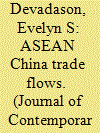

|
|
|
|
|
| Publication |
2010.
|
| Summary/Abstract |
There are claims that China's influence on ASEAN is direct in that she has encouraged more exports to flow into her huge markets and changed trade flows amongst member countries. Demand and supply are deemed to have therefore become more China-centred. This paper looks at the plausibility of China as a 'factor' that influences bilateral intra-ASEAN trade flows through demand (exporting country) and supply (partner country). The key finding of the study is that China's trade association with the region increases intra-ASEAN exports. China is therefore the most practical choice for the ASEAN+1 FTA to initiate deeper trade integration within the region. China, as the 'core' country of the ACFTA can provide complementarities in the export performance of ASEAN.
|
|
|
|
|
|
|
|
|
|
|
|
|
|
|
|
| 2 |
ID:
098102


|
|
|
|
|
| Publication |
2010.
|
| Summary/Abstract |
This article argues that how President Chen Shui-bian's provocative initiatives have impacted cross-strait stability since 2003 generates crucial lessons, not available in the past, for understanding the propelling and constraining dynamics of a cross-strait military conflict in the long run. The lessons are grounded in three interrelated sets of interactive logic: between the Chen Administration and the Taiwan electorate; between Taiwan people's aspiration for an exclusive national identity and their risk-averse proclivity in the face of China's military threat; and between Washington's and Beijing's acts of signaling toward Taipei. Specifically, this article demonstrates that Taiwan's voters at first backed the Chen Administration's provocative initiatives in order to seek a national identity instead of de jure independence, and that such popular support receded dramatically once such initiatives came to be perceived, amidst domestic and international developments, by the voters as drifting away from the identity quest and toward evoking their choice between the status quo and independence. The risk-averse voters turned away from the altered character of the initiatives and thus restrained the reckless politicians, largely because of both Washington's signaling which highlighted the change and the ensuing risk of war, and Beijing's refraining from saber rattling toward Taiwan. The voters' decisions foiled the 2004 and 2008 referenda, and forestalled the DPP in 2004 from acquiring a parliamentary majority necessary for legislating its provocative initiatives such as renaming the country and creating a new constitution.
|
|
|
|
|
|
|
|
|
|
|
|
|
|
|
|
| 3 |
ID:
098103


|
|
|
|
|
| Publication |
2010.
|
| Summary/Abstract |
Leisure education has already become an important concept of the modern education system in the Western world, but it is little established and practiced in China as it has been ignored or overlooked. Therefore, this study, in view of the growing importance of leisure life and leisure education for Chinese college students today, was undertaken in order to examine their current situation with regards to leisure life and leisure education. The study presents the results of a survey on leisure education and activities involving students from universities and colleges in Hangzhou, P.R. China, which shows that due to a lack of leisure skills and capabilities as well as an inadequate understanding of the meaning of leisure, the quality and level of students' leisure life on campus is unsatisfactory. This empirically-based study is trying to probe into the problems relating to leisure education in China and provide some perspectives, analysis and solutions based on the findings of the study. Since few researchers have observed leisure activity and leisure education in China, the study is a contribution to the literature on contemporary Chinese leisure education.
|
|
|
|
|
|
|
|
|
|
|
|
|
|
|
|
| 4 |
ID:
098097
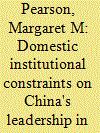

|
|
|
|
|
| Publication |
2010.
|
| Summary/Abstract |
The study of Chinese foreign policy has long shown that domestic politics and domestic constraints are sources of foreign policy, albeit generally considered less potent than ideology and interests. Domestic political constraints should also be explored as factors in Chinese regional policies toward East Asia, including regional economic institutions. This paper examines three domestic institutional constraints on regional foreign policy in the area of trade and economics: a fragmented decision-making structure that has difficulty with coordination, a relatively heavy reliance on top level decision-makers at a time when issues of Asian economic policy have relatively low priority for these same decision-makers, and the relatively extreme lack of autonomy for negotiators vis- -vis top decision-makers in Beijing. These constraints are by any means unique to China. However, at a time when many observers and participants are expecting-indeed, often hoping for-Chinese leadership in the region, the paper posits that these constraints hinder the PRC's ability to fill this role. The key empirical focus is regional trade agreements and regional economic organizations.
|
|
|
|
|
|
|
|
|
|
|
|
|
|
|
|
| 5 |
ID:
098105


|
|
|
| 6 |
ID:
098101


|
|
|
|
|
| Publication |
2010.
|
| Summary/Abstract |
In the last decade Chinese consultative authoritarianism has been renewed through many political and administrative innovations and tools. Authoritarian rule in China is now permeated by a wide variety of consultative and deliberative practices. These practices stabilize and strengthen authoritarian rule, leading to deliberative authoritarianism, an advanced form of consultative authoritarianism. This paper discusses two experiments-deliberative polling at Zeguo, Zhejiang, and a township election in Ya'an, Sichuan. Through these two cases we examine the direction which the development of consultative authoritarianism is presently taking, and the potentials and limitations of such input mechanisms in an authoritarian setting.
|
|
|
|
|
|
|
|
|
|
|
|
|
|
|
|
| 7 |
ID:
098106
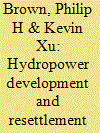

|
|
|
|
|
| Publication |
2010.
|
| Summary/Abstract |
Hydropower represents an important alternative form of energy in China, a country that currently uses coal to supply 78% of its electricity. However, evidence from large hydropower projects in China shows that the socio-economic and environmental costs of hydropower development are substantial. Construction on the first of the 13 planned dams on the Nu River began in the summer of 2008, and villages are already beginning to be displaced. Based on fieldwork in the area, we find that the local resettlement policies infringe upon the national regulations governing resettlement caused by major infrastructure development. This infringement includes high prices for resettlement homes, forcing villagers to leave agricultural production, a lack of programs for long-term economic development, and a lack of transparency in decision-making processes.
|
|
|
|
|
|
|
|
|
|
|
|
|
|
|
|
| 8 |
ID:
098104
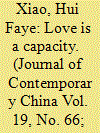

|
|
|
|
|
| Publication |
2010.
|
| Summary/Abstract |
Employing analytical tools mainly from cultural studies and feminist theories, this article examines the televisual representation of changing family values, intimate relationships and gender dynamics parallel to China's neoliberal turn. Specifically, I will offer a close reading of Chinese-Style Divorce, a mega-hit television drama, in a larger context of sociopolitical conditions and cultural trends, particularly a neoliberal market economy and the ongoing state-sponsored 'harmonious society' campaign. I intend to explore how cultural representations of divorce play a key role in projecting and channeling the desire and fantasy of a middle-class domestic culture and in articulating a discourse of domestic and psychic interiority. Tackling rampant gender-related social problems in contemporary China, this article also seeks to address the predicaments with which middle-aged post-reproductive divorced women are confronted in a transitional time.
|
|
|
|
|
|
|
|
|
|
|
|
|
|
|
|
| 9 |
ID:
098099
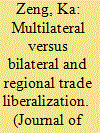

|
|
|
|
|
| Publication |
2010.
|
| Summary/Abstract |
In recent years, at the same time it has pursued multilateral trade negotiations via membership in the World Trade Organization (WTO), China has embraced a regional approach to trade liberalization by negotiating a number of bilateral or regional free trade agreements (FTAs) with its trading partners. This paper examines China's increasingly active FTA diplomacy and seeks to explain China's motives for pursuing expanded FTAs. Specifically, this paper argues that while China's FTA activism reflects considerations about enhancing China's influence in the Asia-Pacific region, capturing the economic gains of FTA participation, and minimizing the trade and investment diversion resulting from the competitive dynamics of regional trade liberalization, the move toward expanded FTAs is also consistent with the desire to create alternative bargaining forums over trade issues that could help to stabilize expectations as well as the need to use FTAs to control the pace of trade liberalization so as to accommodate protectionist pressure emanating from domestic interest groups. In particular, this paper highlights the impact of domestic politics on China's FTA negotiations through a detailed discussion of how pressure from protectionist seeking interests influences the scope and depth of China's FTAs.
|
|
|
|
|
|
|
|
|
|
|
|
|
|
|
|
| 10 |
ID:
098096


|
|
|
|
|
| Publication |
2010.
|
| Summary/Abstract |
A review of four periods and a comparison of three regional institutions provide evidence for how serious China has become about multilateralism with its neighbors in Asia. Approval for multilateralism does not mean that China is ready to endorse strong regional organizations that bind their members, especially when it has reservations both about institutions that could undermine its narrow notion of sovereignty and norms that could support US or even Japanese efforts to impose long-feared universal values. If China calculates that limited multilateralism now provides a variety of benefits, to date its support reflects specific circumstances, not general trust in this format. Focusing on the Six-Party Talks as the presumed foundation for regionalism in Northeast Asia offers a concentrated view of strategic thinking toward the area most vital to China's security. In the standoff between North Korea and the United States we are able to assess the degree to which China accepts working with four or five states and the prospects for its active support, if circumstances permit, for the establishment of a peace and security mechanism through the fifth working group that originated in the Joint Agreement of February 2007.
|
|
|
|
|
|
|
|
|
|
|
|
|
|
|
|
|
|
|
|
|